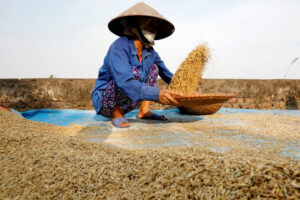THE REDUCTION in Philippine rice import tariffs could have a knock-on effect on global rice prices by inducing its major suppliers Vietnam and Thailand to commit greater volumes to the world’s largest rice importer, thereby causing overall global supply to tighten, Fitch Solutions unit BMI said.
“We believe that reduced rice import duties in the Philippines will see import volumes increase, to the probable benefit of traders in Vietnam, the largest exporter of rice to the Philippines, and to a lesser extent Thailand,” BMI said in a report.
“Which, in turn, will — all other things being equal — stimulate upward price pressures in the international rice market,” it added.
President Ferdinand R. Marcos, Jr. last month signed Executive Order (EO) No. 62, which slashed tariffs on rice imports to 15% from 35% previously, until 2028. This is part of a reduced tariff regime for other agricultural products such as pork and corn, intended as inflation-containment measures.
The EO calls for a review of the tariff schedule every four months.
“We note, however, that international rice prices remain elevated and that — with India’s rice export restrictions still in place and the negative impact of the recent El Niño event on rice production in Southeast Asia via below-average rainfall in mind — the international rice market remains tight, which could, therefore, see an increase in Philippine import demand stimulate upward international price pressures,” BMI said.
The US Department of Agriculture (USDA) expects Philippine rice imports to hit 4.7 million metric tons (MMT), upgrading its earlier forecast of 4.2 MMT.
As of June 6, the Philippines imported 2.17 MMT of rice. Vietnam accounted for almost three-fourths of overall shipments.
The Philippines imports about 20% of its rice requirement annually.
BMI sees Philippine rice prices easing eventually after the tariff cut but this will not have any impact in the immediate term.
“In the near term, we expect that the reduction in rice import tariffs could see domestic rice price pressures in the Philippines ease — notwithstanding the widening in the Philippine domestic rice production deficit between 2023/24 and 2024/25 that the USDA forecasts.”
“In the immediate term, however, the reduction will not have a noticeable impact on domestic prices due to the feedthrough time lag.”
The Department of Agriculture (DA) said the average retail price of domestically grown well-milled rice averaged P48-55 per kilogram as of June 29, up from P39-46 a year earlier.
Regular milled rice cost P45-52 from P35-42 per kilogram a year earlier.
The tariff cut is expected to cut rice prices by P6 to P7, the DA has said.
The National Economic and Development Authority has indicated its readiness to adjust tariffs if prices decline. — Luisa Maria Jacinta C. Jocson






